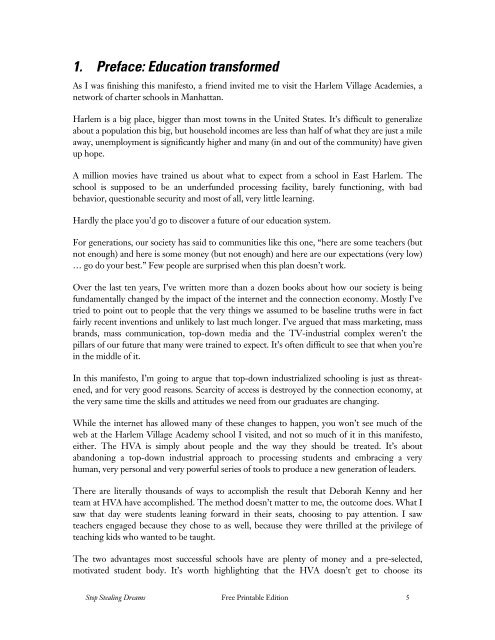1DO0vxU
1DO0vxU
1DO0vxU
You also want an ePaper? Increase the reach of your titles
YUMPU automatically turns print PDFs into web optimized ePapers that Google loves.
1. Preface: Education transformed<br />
As I was finishing this manifesto, a friend invited me to visit the Harlem Village Academies, a<br />
network of charter schools in Manhattan.<br />
Harlem is a big place, bigger than most towns in the United States. It’s difficult to generalize<br />
about a population this big, but household incomes are less than half of what they are just a mile<br />
away, unemployment is significantly higher and many (in and out of the community) have given<br />
up hope.<br />
A million movies have trained us about what to expect from a school in East Harlem. The<br />
school is supposed to be an underfunded processing facility, barely functioning, with bad<br />
behavior, questionable security and most of all, very little learning.<br />
Hardly the place you’d go to discover a future of our education system.<br />
For generations, our society has said to communities like this one, “here are some teachers (but<br />
not enough) and here is some money (but not enough) and here are our expectations (very low)<br />
… go do your best.” Few people are surprised when this plan doesn’t work.<br />
Over the last ten years, I’ve written more than a dozen books about how our society is being<br />
fundamentally changed by the impact of the internet and the connection economy. Mostly I’ve<br />
tried to point out to people that the very things we assumed to be baseline truths were in fact<br />
fairly recent inventions and unlikely to last much longer. I’ve argued that mass marketing, mass<br />
brands, mass communication, top-down media and the TV-industrial complex weren’t the<br />
pillars of our future that many were trained to expect. It’s often difficult to see that when you’re<br />
in the middle of it.<br />
In this manifesto, I’m going to argue that top-down industrialized schooling is just as threatened,<br />
and for very good reasons. Scarcity of access is destroyed by the connection economy, at<br />
the very same time the skills and attitudes we need from our graduates are changing.<br />
While the internet has allowed many of these changes to happen, you won’t see much of the<br />
web at the Harlem Village Academy school I visited, and not so much of it in this manifesto,<br />
either. The HVA is simply about people and the way they should be treated. It’s about<br />
abandoning a top-down industrial approach to processing students and embracing a very<br />
human, very personal and very powerful series of tools to produce a new generation of leaders.<br />
There are literally thousands of ways to accomplish the result that Deborah Kenny and her<br />
team at HVA have accomplished. The method doesn’t matter to me, the outcome does. What I<br />
saw that day were students leaning forward in their seats, choosing to pay attention. I saw<br />
teachers engaged because they chose to as well, because they were thrilled at the privilege of<br />
teaching kids who wanted to be taught.<br />
The two advantages most successful schools have are plenty of money and a pre-selected,<br />
motivated student body. It’s worth highlighting that the HVA doesn’t get to choose its<br />
Stop Stealing Dreams Free Printable Edition 5


